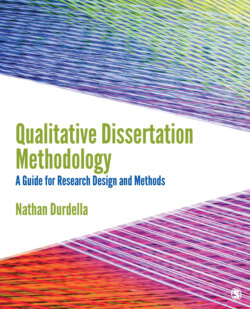Читать книгу Qualitative Dissertation Methodology - Nathan Durdella - Страница 32
На сайте Литреса книга снята с продажи.
Attitude.
ОглавлениеAs they say, attitude is everything. Well, the same adage tends to hold true in academic life: explore attitudes of potential advisors (Thomas & Brubaker, 2007). How your chair feels about your topic, problem, purpose, questions, methods, and so on—the stuff of your study—generally shapes your experiences with them. Further, how potential chairs feel about the value of qualitative research is important to the success of your dissertation study. The idea here is that if they have an interest in your study, then they will engage with you and stay connected to your progress, perhaps because they have a stake in scholarly activity in the area and follow new and emerging investigations related to the topic. In other words, they perceive a career advantage or professional benefit in working with you—even if just to extend what they know about the topic. A related notion here is an attitude of “mutual respect and faculty confidence in your abilities” (Meloy, 2002, p. 34). A few key questions related to a prospective chair’s attitude about your research are as follows: Do they understand what I propose to do? Are they interested in what I am planning? How have they come to know my research topic and/or methodological approach? If you need to work with someone who shares your passion for an area of inquiry, then you have to explore how she or he feels about your study.
Dissertation Chair as Research Supervisor
At the dissertation phase of students’ tenure in a doctoral program, the faculty advisor role of research supervisor generally takes on greater significance. Between study design and proposal writing, data collection and analysis, and write up, students need close support and supervision from a qualitative research expert. As each dissertation is unique and reflects the distinct combination of personal, professional, and programmatic factors that shape this type of empirical investigation, the overall dissertation research process tends to be formulaic. While not meant to oversimplify dissertation research processes or experiences, especially qualitative dissertation work, you can be relatively sure that if students follow requirements codified in program, department, and university policies and work within social and behavioral science standards, they will be much more likely to complete their study. Here, faculty advisors with specific experiences in each step of the qualitative research process and insight into how to resolve issues that arise in design and implementation of qualitative research serve to implement these standards and interpret policies and practices for doctoral student use in their dissertation studies.
